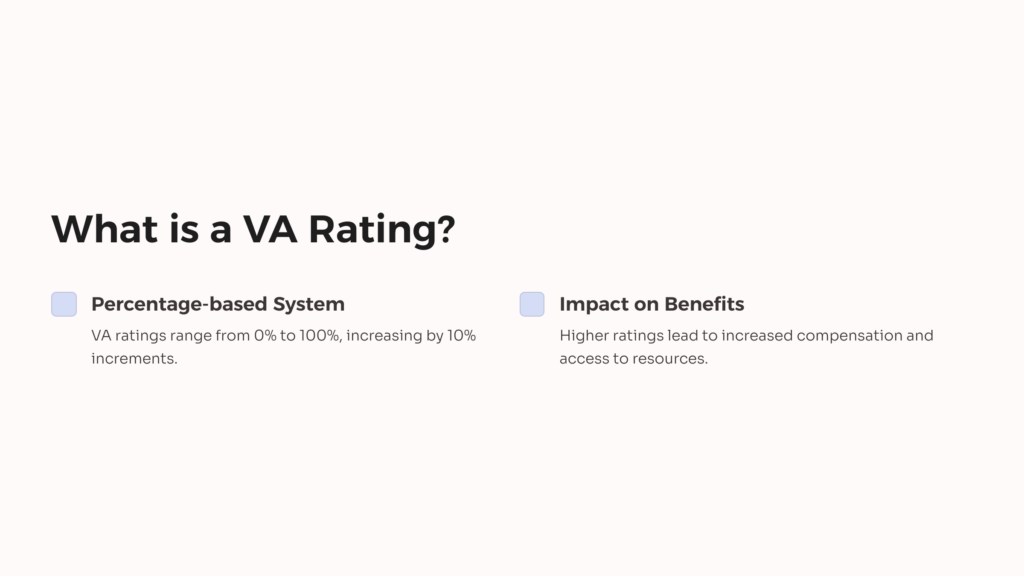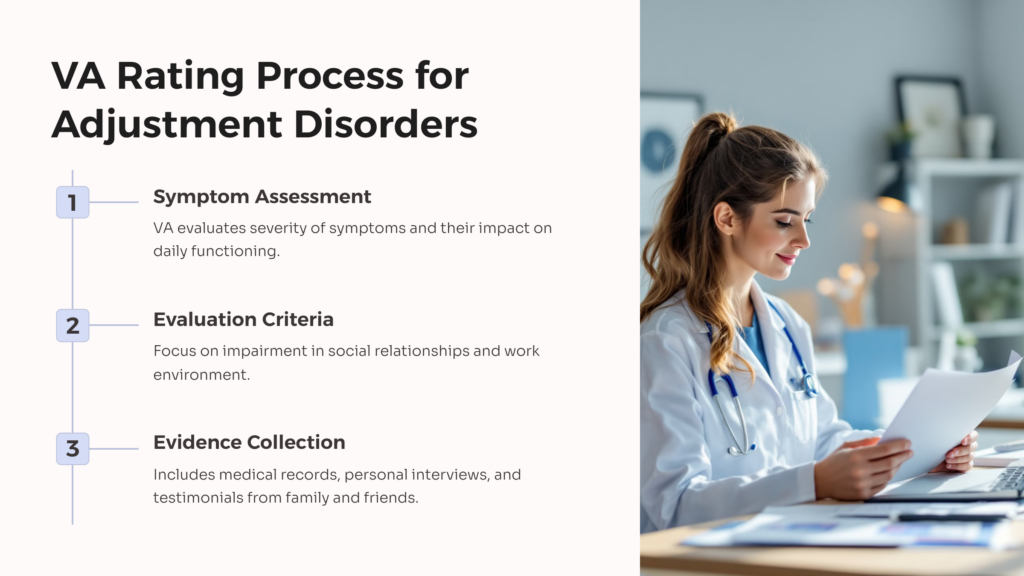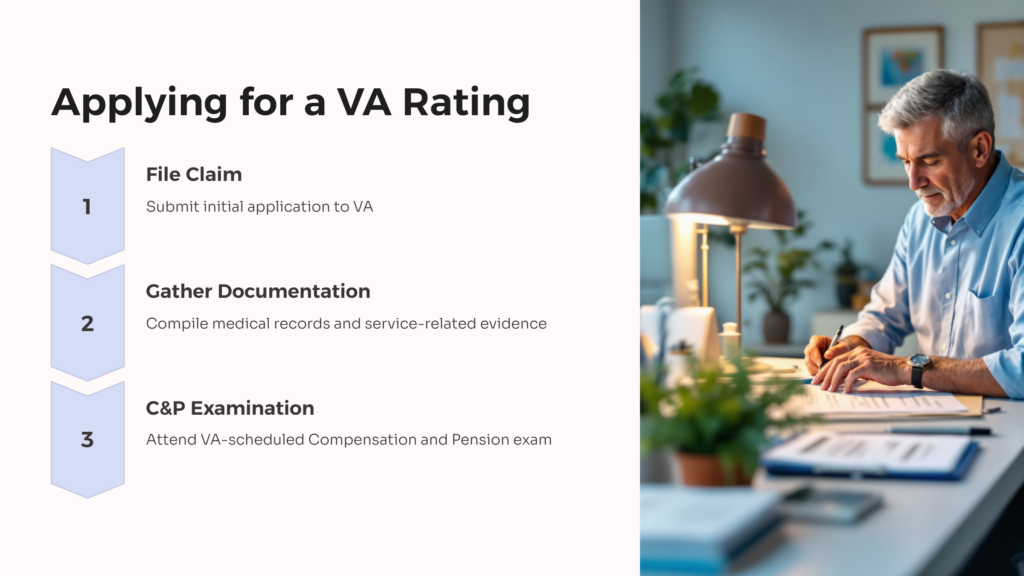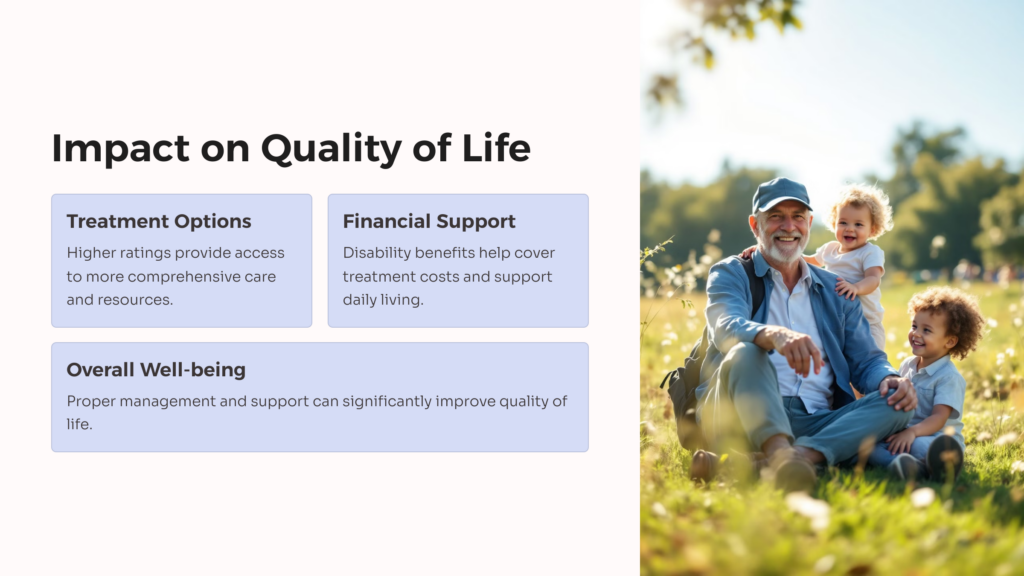Introduction
What is a VA Rating?

The Veterans Affairs (VA) disability rating is a percentage that the VA assigns to veterans to represent the level of their disability. The ratings, which range from 0% to 100%, increase incrementally by 10% but are not always a whole number. The disability rating veterans receive serves as a measure of how a veteran’s service connected disability affects their ability to function in their daily life and determines the amount of compensation they will receive. Understanding the VA disability rating is crucial because it directly affects the benefits that veterans are eligible to receive.
Understanding Adjustment Disorder
Adjustment disorder, also popularly known as “situational depression,” is a short-term, reactive mental disorder that occurs as a response to a significant life change or stressful circumstance. These situations can range from divorce, the loss of a loved one, a severe illness, or a sudden change like retirement. In the military community, such changes could mean deployment, readjustment after deployment, or transitioning from military to civilian life. Symptoms of adjustment disorder may include anxiety, a depressed mood, insomnia, panic attacks, withdrawal from loved ones, and difficulty completing daily tasks. Adjustment disorder differs from Generalized Anxiety Disorder (GAD) and Major Depressive Disorder because those with GAD have often had a history of feeling anxiety about many things and those with depression generally experience more symptoms of depression than those with adjustment disorder, who generally experience few symptoms of depression beyond a depressed mood. Those with adjustment disorder develop symptoms in response to a change in circumstances or stress levels. Chronic adjustment disorder, similar to other mental health disorders, is a recognized VA disability, and if you are diagnosed, you are eligible for VA disability benefits.
The Connection between the VA and Adjustment Disorders
Prevalence of Adjustment Disorder among Veterans
The prevalence of adjustment disorder amongst veterans is more common than we might think. Adjustment disorders frequently occur in tandem with the stresses of readjusting to civilian life or reflecting on traumatic experiences at war. In fact, a study by the U.S. Department of Veterans Affairs discovered that adjustment disorder was the third most common mental health condition diagnosed among veterans who served in Afghanistan and Iraq.
Why Veterans are Susceptible to Adjustment Disorders
Veterans are particularly susceptible to adjustment disorder due to the unique pressures synonymous with military life. The abrupt transition from a highly structured military environment to civilian life can be distressing, leading to difficulty adapting, feelings of isolation, and in some cases, an onset of adjustment disorder.
How the VA Rates Adjustment Disorders

Detailed Explanation of the Rating System
To get an adjustment disorder VA rating, Veterans Affairs appraises the severity of symptoms and their impact on a veteran’s day-to-day functioning, then assigns a disability rating to correspond to that impact. The rating system moves from 0%, indicating no significant impairment, to 100%, indicating total social and occupational impairment.
Dissecting the Evaluation Criteria
The VA assesses veterans based on established criteria that scrutinize a veteran’s daily activities, social relationships, and overall ability to function in a working environment. There’s a focus on significant areas of impairment, such as depressed mood, anxiety, and disturbances in motivation and mood.
The Process for Evaluation
The VA rating process involves documenting personal interviews conducted by mental health professionals along with comprehensive medical record reviews to understand the case from every possible angle. Besides this, the VA may also consider additional support evidence, such as testimonials from family members and friends.
Level of Impairment and VA Ratings
Defining Levels of Impairment
The VA defines levels of impairment in functionality based on the severity of symptoms and how they affect an individual’s ability to function in personal and professional life. Levels of impairment function as a threshold system and can range from mild, where symptoms are transient and easily handled by most people, to severe, where there’s a major impact on a veteran’s ability to function in their daily life.
Correlation between the Severity of Symptoms and the VA Rating
A clear relationship exists between the severity of a veteran’s symptoms and their VA rating. A higher severity usually translates into a higher VA rating since the veteran will require more medical help, and will receive a higher disability compensation.
Effects of Lower and Higher Ratings on Benefits and Treatment
A higher rating typically means a higher disability compensation, while a lower rating can lead to fewer benefits. Thus, ratings directly influence medical treatments and rehabilitation opportunities that veterans may receive.
How to Apply for a VA Rating

Step-By-Step Guide to the Application Process
The application process involves initially filing a claim with the VA. Following this, VA officials will schedule a C&P examination to confirm the diagnosis and ascertain the severity.
Necessary Documentation
Important documents include discharge or separation papers, service treatment records, and private medical records that indicate how your adjustment disorder links to your service. These need to be meticulously compiled and submitted.
Role of Medical Professionals and Advocacy Groups
Medical professionals play a vital role in providing detailed medical evidence to support the claim, while veteran advocacy groups provide guidance in understanding and navigating the complex system.
Tips on Maximizing Your VA Rating
Importance of Complete and Accurate Medical Records
Accurate and up-to-date medical records are crucial in establishing the severity of your adjustment disorder and its effects on your life. Consistent medical care and records reflecting this treatment positively influence the VA rating decision.
Treating and Managing Adjustment Disorder
Managing adjustment disorder is a dynamic process that requires consistent medical care. Appropriate treatment, such as psychotherapy or medication, can decrease the severity of symptoms and improve quality of life.
Importance of Continuity in Care and Treatment
Consistent care can be a significant factor in influencing your VA rating. It not only provides the necessary treatment but also offers tangible evidence of your medical history and the continuity of your symptoms.
The Impact of VA Rating on Quality of Life

How the VA Rating Influences Treatment Options
The VA ratings play an influential role in determining access to various treatment and rehabilitation programs. Higher ratings might grant veterans access to additional resources not available to those with lower ratings.
VA Ratings and Disability Benefits
VA ratings also crucially influence the disability benefits a veteran can receive, helping to cover the costs of treatments and support an adequate quality of life.
Case Studies Showing the Impact of VA Ratings
A number of case studies elucidate the significant impact VA ratings can have on a veteran’s life. For instance, veterans with higher ratings have access to a wide array of resources, reducing the financial burden and providing comprehensive support.
Navigating Complexities of the VA Rating for Adjustment Disorders
Common Challenges
Some common challenges with the VA rating system include bureaucratic red tape, delayed decisions, and understanding the complex application process — all of which can be overwhelming for veterans already dealing with adjustment disorder.
Overcoming Bureaucratic Hurdles
Overcoming these hurdles usually involves staying organized, maintaining detailed medical records, and being proactive in dealing with the VA. Veterans should consider seeking out help from professional advocates or experienced advisors.
Seeking Help from Professionals and Advocacy Groups
Professional help from Veteran Service Officers (VSOs) and advocacy groups can be instrumental in helping veterans navigate these complex systems.
Conclusion
Recap of the Importance of Understanding and Maximizing VA Rating
Understanding and maximizing VA Ratings can significantly improve the quality of life for veterans diagnosed with adjustment disorder. Increased awareness and proactive management can help maximize access to treatment options and benefits.
Final Thoughts on the Role and Management of Adjustment Disorders among Veterans
Adjustment disorder is a significant issue among veterans, with potential long-term effects if not properly managed. The VA Rating system acts as a crucial backbone in ensuring access to the necessary resources, but it also emphasizes the importance of seeking and maintaining treatment to manage the severity of the disorder effectively. Awareness, understanding, and proactive management are crucial steps on the path to improving the well-being of veterans living with adjustment disorders.
 AllVeteran.com Advisors
AllVeteran.com Advisors
With expertise spanning local, state, and federal benefit programs, our team is dedicated to guiding individuals towards the perfect program tailored to their unique circumstances.











